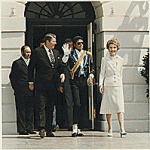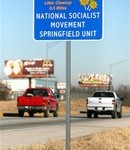Michael Jackson v. Prince: Thinking About Copyright, Intellectual Property, and the Age of the Eighties
 Irene’s recent post on why we love intellectual property gets at its certain power–its ubiquity in everyday life. The recent death of Michael Jackson speaks to that particular ubiquity. What was necessarily powerful about his death was that for kids of a certain generation (maybe if you were born between 1972 and 1980?), his music served, as the pundits keep saying over and over, as the “soundtrack” of our lives. I remember one slumber party where all of the Michael Jackson videos played over and over and over for 24 hours (those poor parents). The summers of 1983 through 1985 were consumed in the great debate (forget US v. USSR) of the middle 1980s: who was better, Michael Jackson or Prince! I was a stone cold Prince fan, who marshaled my arguments as if I was getting ready for battle (Purple! Let’s Go Crazy!, Purple!). I was usually in the minority in that one, as no one could top Michael’s videos (did Prince dance with zombies (No!), could Prince moonwalk (No!), could Prince rock that awesome red jacket (No!)).
Irene’s recent post on why we love intellectual property gets at its certain power–its ubiquity in everyday life. The recent death of Michael Jackson speaks to that particular ubiquity. What was necessarily powerful about his death was that for kids of a certain generation (maybe if you were born between 1972 and 1980?), his music served, as the pundits keep saying over and over, as the “soundtrack” of our lives. I remember one slumber party where all of the Michael Jackson videos played over and over and over for 24 hours (those poor parents). The summers of 1983 through 1985 were consumed in the great debate (forget US v. USSR) of the middle 1980s: who was better, Michael Jackson or Prince! I was a stone cold Prince fan, who marshaled my arguments as if I was getting ready for battle (Purple! Let’s Go Crazy!, Purple!). I was usually in the minority in that one, as no one could top Michael’s videos (did Prince dance with zombies (No!), could Prince moonwalk (No!), could Prince rock that awesome red jacket (No!)).
This “great” debate of the Eighties morphed, though, in the Nineties, into a more interesting debate about, strangely enough, the performance artist’s relationship to copyright.


 This week, I want to try to tie together some aspects of three experiences I recently had, and tell why I believe they reflect something about the evolving nature of justice at this point in human history.
This week, I want to try to tie together some aspects of three experiences I recently had, and tell why I believe they reflect something about the evolving nature of justice at this point in human history.